
The Roman Goddess of luck and fate, Fortuna, was one of Rome's favorite Goddesses worshipped under a bewildering array of epithets for every circumstance and station of the worshipper. She was even divided into specific aspects for the Roman social classes, and as such was worshipped as Fortuna Plebis, Fortuna Equestris, and Fortuna Patricia, for the plebeian, equestrian, and patrician classes respectively. Fortuna Equestris, as the Goddess of the Fortune of the equites, or horsemen class, was also a Goddess of their horses; She has been treated on Her own page here. Fortuna Plebis and Fortuna Patricia, Goddess of the Luck of the commoners and nobles, have been grouped together here. The plebeians were the commoner class of ancient Rome. They may have descended from the original population of the area conquered by the early tribes who would come to form the patricians, or noble class, of Rome. As conquered people, they were to some extent dependent on the conquerors who had taken their land, and as such had limited rights; the early history of the Roman Republic chronicles the struggles between the two classes and the demands of the plebeians for rights, who were originally excluded from the workings of the government and priesthood, though they could, of course, be compelled into the army. In time they did win some rights, such as being able to elect their own tribunes (literally, an "officer of the tribe") and aediles (who assisted the tribunes); and furthermore, it was made into law that at least one of the two consuls, the highest magisterial office of Rome (roughly equivalent to a joint presidency) elected each year had to be a plebeian. The patricians were the "nobles" from whom the senators, priests, and other civil servants were chosen; they traditionally descended from the three early tribes of Rome, made up of Latins, Sabines, and Etruscans, who settled on the hills by the Tiber, forcing the original inhabitants out. From their ranks the equites, or horsemen class, were also taken. Given the struggles between the plebeians and the patricians one wonders how Fortuna, as both Fortuna Plebis and Fortuna Patricia, could be on both sides of the conflict at once, as it were. |
|
|
